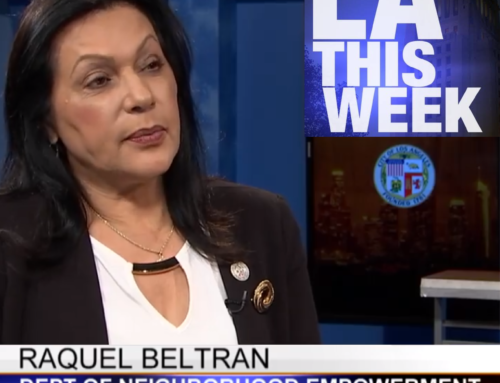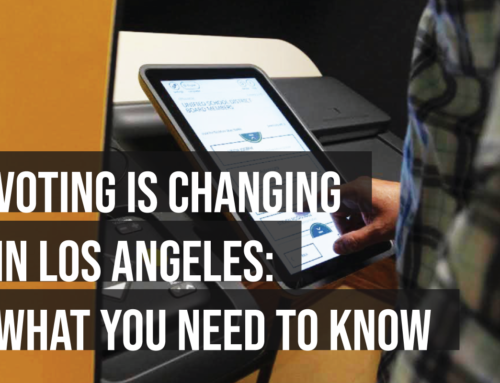By Tony Wilkinson
The Department of Water and Power Reform measure (CF 16-0093) will soon go to the kitchen. By the end of May, City Council President Herb Wesson, with input from Mayor Eric Garcetti, will make sausage out of all the separate reforms in the proposal. His Rules committee will then ask the City Attorney to draft language for the November 2016 ballot.
If you have strong opinions on what should be in the DWP Reform package, send a personal email NOW to Andrew Westall, who is Council President Wesson’s assistant chief deputy (Andrew.Westall@lacity.org).
The final Rules committee special meeting to take public input on the proposal is scheduled for Friday, May 27 at City Hall at 8:30 am. It will feature input from the environmental community. Because that meeting will still be taking public input, we think it is most likely that a special Rules meeting will be called on Tuesday, May 31 to announce the package. The draft language will be returned by the City Attorney on Monday, June 6.
The Rules meeting in the Crenshaw area last night (Thursday, May 19) was a great discussion. Business organizations presented their views. The many public comments were lively, engaged, and helpful. The reasons for DWP Reform came into clear focus.
A BUSINESS, NOT A BUREAUCRACY: First, DWP is a business. It produces services that it sells to customers. Over the years, fueled by public distrust, DWP has become micro-managed by city government. Because of this, it cannot operate efficiently, has not focused on good customer service, and is not adapting quickly enough to the fast changing world of public utilities. A $3.7 billion business with $1.6 billion in annual capital expenditures has to send contracts over $150,000 to the City Council for approval. Contracts can take more than a year to execute. None of this micro-management helps DWP to meet the policy objectives of elected officials or the service expectations of the citizens that own it.
Last night the public made it clear that DWP is not a private for-profit business. It is a civic asset and part of the fabric of our city. Probably the best word to describe what DWP Reform is about is allowing the Department to be more businesslike. This change should include talking to and engaging its customers, just as a successful private business does.
CITY’S CIVIL SERVICE PRESERVES THE PAST: The second key point in DWP Reform is that DWP should have the flexibility to hire the technical skills it needs, and the ability to add experienced managers who have a track record of success. It is prevented from doing this by the current Civil Service system. The key barriers are having fewer than 20 exempt positions in a labor force of nearly 9,000, and the requirement that management promotions be based on seniority rather than effectiveness.
The Fuentes motion, CF 16-0093, calls for eliminating the Charter requirement that DWP use the city’s Civil Service system. DWP still could not abandon Civil Service without the agreement of its labor partners. Throughout the public discussion, however, there seems to be little appetite for total elimination of Civil Service at the Department. Its role in defeating discrimination is acknowledged. Everyone wants to keep DWP a great place to work with job security and most promotions from within. The issue is that the current employment system prevents DWP from operating like a business.
The Charter should clearly state that DWP may create its own Civil Service system with its own exemptions. Many classifications and tests would better match its special technical needs. A new system could adjust the role of seniority in promotions. Also, some of the good workers in the Pre-Craft Training Program have overcome a criminal conviction. This keeps them out of the existing Civil Service system. A new system could accept many more proven workers.
The number of exempt positions needs to be much higher in order to add important current skills to the workforce and to replace retiring craft workers and managers. Last week this writer suggested 5 percent of authorized positions. Los Angeles County uses 10 percent, which is probably a better number. Nearly half of DWP workers are eligible to retire in the next five years. This is not theoretical — it’s happening. In just the month of April, 500 workers (nearly 6 percent of the DWP workforce) filed for retirement.
SUPPORTING A BUSINESSLIKE DWP: The DWP Reform package has DWP managed by a more powerful and independent Board that is supported by its own analytical staff, advised by its own attorneys, and informed by a strengthened and independent Ratepayer Advocate. The Board would be checked in its powers by the ability of the City Council to veto many of its actions, including rates. Other powers would still require City Council action.
STAFF: A Board with diverse skills would have a staff similar to the Chief Administrative Officer (CAO) analysts. This staff would help them to review proposals from DWP that today can fall short of what the Board says that it needs for analysis.
COUNSEL: The question has been asked, “Has anyone identified a problem with the existing advice from the City Attorney?” Well, as long as DWP is operating like a city bureaucracy, the 50 city attorneys that now serve it are serving well. With reform, DWP will start operating more like a business. If it needs legal advice on doing something that makes the City Attorney hesitant (perhaps for city reasons beyond DWP’s business), the Charter allows the City Attorney to deny DWP’s request to use outside counsel. This amounts to controlling management options by denying access to essential advice. The power to retain outside counsel is an essential component of effective business management.
UTILITY GURUS: Maybe the public envisioned a TV-oriented firebrand when they voted for an independent Ratepayer Advocate. Instead, Dr. Fred Pickel has made his Office of Public Accountability (OPA) into a small team of highly skilled utility consultants. They proved their worth in the last rate case by helping the DWP Board to add performance metrics, add a mid-course correction half way through the five years, and to reduce the power rate increase. To handle more issues, the OPA needs to expand beyond the three specialists now on staff. The minimum funding in the Charter should be doubled (to about what the OPA is spending now).
Please send your questions and comments to dwpmou@EmpowerLA.org. DWP Reform information will be posted regularly at https://empowerla.org/dwpmou. There is additional information at http://dwpreform.lacity.org.
Tony Wilkinson is the Chair of the Neighborhood Council – DWP MOU Oversight Committee. He will be contributing information on the DWP Reform process to the EmpowerLA newsletter each week.






